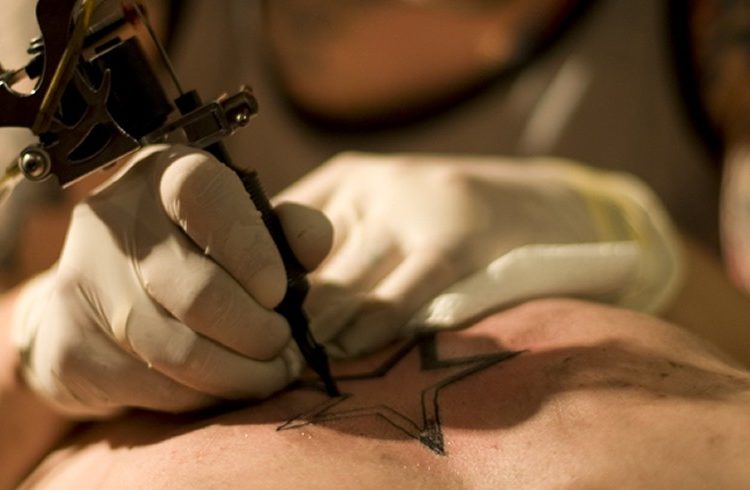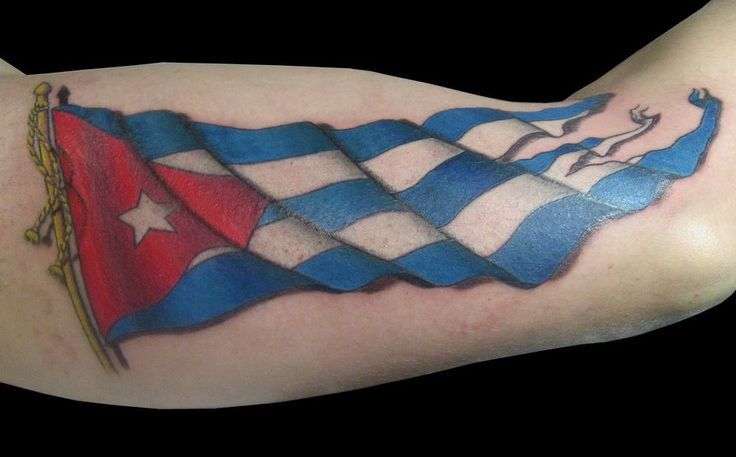The vast majority disregard that fact that paying for a tattoo is technically illegal in Cuba, according to the country’s current laws, which is why numerous tattoo parlors have been shut down, mainly in Havana.
Representatives from the Department of Managing Inspectors (DIS) in Havana have confronted artists in their studios, with the express order to shut down. Fearing seizures and fines, proprietors have either close up shop or continue to operate illegally.
Nonetheless, many clients and lovers of the artistic manifestation question the persecution, asking why can’t I have tattoo?
“Its not a recent ban, its simply that it was never permitted,” said lawyer Alberto Castro García, who together with his colleague Carlos Manuel Díaz has provided legal council to those affected. “The government published a list of self-employment options in the Official Extraordinary Gazette #27 of September 26, 2013, and tattooing doesn’t appear among the authorized activities. Anything not included in the document instantly falls in to the sphere of illegality.”
Said legislation explicitly excludes tattooing. Limitations are outlined under the activity of painter-sign maker: “creating signs of any kind, size and color, on objects or surfaces, excluding a person’s skin.”
This legal technicality deprives dozens of tattooists, some who have been practicing their trade for over 20 years, of legal protection. Such is the case of Leo Canosa, renowned artist and founder of La Marca studio, in Old Havana.
“We are waiting to see what might happen,” Canosa told OnCuba, “Luckily they haven’t knocked at our door yet so we will keep operating. We know that they’ve shut down other parlors, so we’ve invited those affected – and people who fear it will happen to them – to use our space.”
New business or an ancient art?
According to writer and professor Margarita Mateo in her essay Skin and Memory, “Tattooing is an old tradition in Cuba, whose origin seems to date back to the tribal markings on African slaves brought over to the island, in prolific discourse with the ink of the Chinese coolies.”
For centuries, this practice was limited to certain groups of people, usually from marginalized sectors of society. But since the second half of the 20th century, tattooing began to be viewed from a more artistic perspective.
Despite support from art critics, Cuban institutions continue to hold a rather closed view of tattooing. Only the Asociación Hermanos Saíz (AHS), which brings together young creators from across the entire island, has offered any kind of support to tattoo artists.
Nonetheless, during the 1990s, and still lacking legal authorization, collective expositions and encounters with foreign artists took place, consolidating the practice on the island. These encounters saw the emergence of several exponents of the art form, many of whom are still operating in the country today.
Health concerns
Although authorities have targeted tattooing given that it is technically an economic crime, the most crucial factor has been completely overlooked: the need for regulations governing hygiene standards.
“Due to the fact that it is illegal, individuals who carry out such a practice are not considered to possess the necessary knowledge to do so, at least not officially within the country,” said Dr. Miriam Álvarez Viltres, primary healthcare specialist. “Those who go to get a tattoo done at these places run the risk of infection, given that no specialist has verified if the correct sterilization processes have been adhered to.”
La Marca manager Leo Canosa, said that tattoo artists abroad receive basic nursing and sterilization courses, without which they cannot obtain the necessary medically certified licenses to operate. Given the inexistence of pertinent legislation in the country, no Ministry of Public health employee can perform an evaluation of a studio’s compliance with health and hygiene standards.
“As long as it [tattooing] isn’t recognized as a legal economic activity, a license specifically related to this practice cannot be issued,” said Álvarez, who also works as an assistant medical professor at the Finlay-Albarrán Faculty.
“With a hygiene license, an establishment’s adherence with health measures could be verified. In any case, people will continue to get tattoos and the best we can hope is that they are done in an organized and safe way,” she added.
Tattooing a crime?
For now, the pesky inspectors have stopped pursuing tattooists, according to Yanser Fraga León, AHS vice president of artistic creation. “To date, we have received no more reports of closures or inspections, which leads us to believe that our appeals have been heard by representatives of the provincial government, responsible for the DIS,” he told OnCuba.
“In a meeting with the entity, we explained about the art of tattooing, given representatives’ notable unfamiliarity with the subject. We are trying to stop the closures. We believe, and expressed as such to provincial government and department of Culture authorities, that these kinds of actions in the 21st century taking against this artistic expression is a mistake,” he said.
Even if the efforts of the AHS were able to temporarily stop the persecution, there still remains a legal loop-hole which prevents tattooists from operating lawfully. As long as the law remains unchanged, the problem will continue to persist.
“The initiative must come from the Council of State and Council of Ministers, the relevant entities with the power to approve modifications to the Law. Given the way in which legislation works in the country, the quickest way would be for a Ministry to propose the legalization of tattooing to the Council of State, and that said institution establish the relevant procedures to do so,” lawyer Alberto Castro said.
He also identified the Ministry of Culture as the key institution to drive forward the process. The Ministry of Labor and Social Security must also participate, in order to grant and control licenses for self-employed persons, and the Ministry of Public Health to regulate hygiene-health standards.
Likewise, Yanser Fraga said that the Ministry of Culture is currently in talks with government authorities of Havana, to determine how the change in legislation “would work, with the consensus of tattooists or artists who practice the trade.”
Although the young representative seems hopeful and states that “the meeting held with the Ministry of Culture should result in a definitive solution to the problem,” those affected don’t believe that tattooing will be legalized anytime soon.
Michel Martínez Guerrero, tattooist, artist and former director of the AHS Visual Arts Department, recalls the numerous calls he has made for this occupation to be recognized.
“During the association’s 2nd Congress, in 2013, I asked the deputy minister of culture, Fernando Rojas, when he was going to address our case. It’s being dealt with,” said Guerrero at his Nuevo Vedado Studio. “And since then, look how many obstacles we’ve faced.”
For now, these artists must wait for the campaign for a change in legislation to bear fruit. According to the advice of lawyers, at most, they could try to “sensitize” the relevant authorities to the issue. However, until this technicality is resolved, charging for a tattoo in Cuba will continue to be a crime punishable by law.
“The solution can’t be to ban charging,” said Yoandris Santos, who has been working as a tattoo artist for 12 years. “Do they really think I’m going to invest 300 dollars in inks and equipment from abroad to tattoo for free? How does that make sense?”












I DID MY TATOO IN VARADERO 5 YEARS AGO